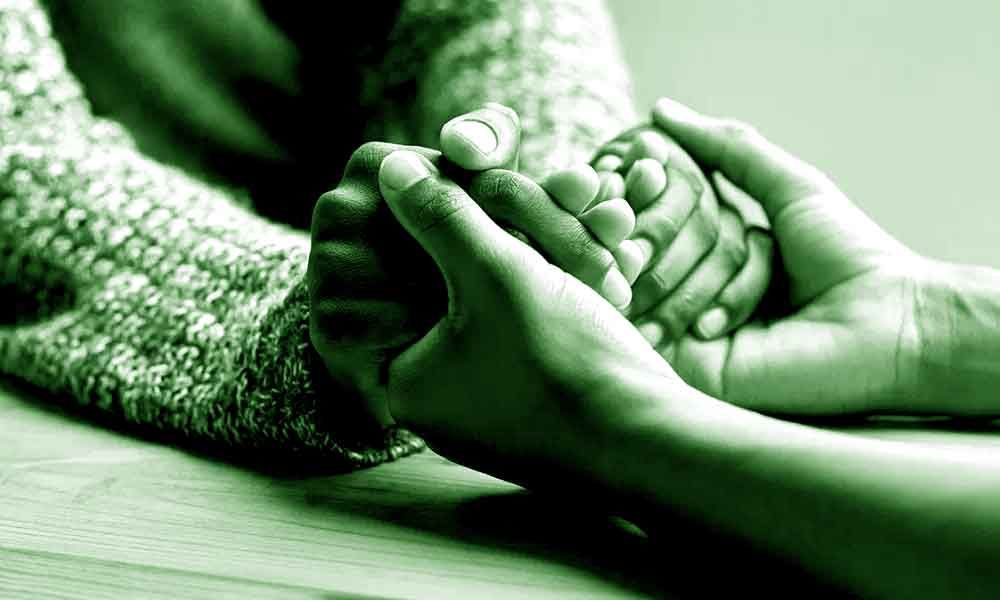Stay positive is not good advice for people who are chronically ill. Here's why

"Did you consider listing all the positive things in your life that are happening? "I was asked by my therapist.
"Did you consider listing all the positive things in your life that are happening? "I was asked by my therapist.
I was winning a bit at the words of my therapist. Not because I thought it was a bad thing to be thankful for the good in my life, but because it glossed over the complexities of everything I felt.
I spoke to her about my chronic illnesses and how it affects my depression—and her response was, to say the least, invalidating. She was not the first person to suggest this to me — not even the first professional of medicine.
But it feels like a direct hit to my spirit every time someone suggests positivity as a solution to my pain.
I began to ask myself when I was sitting in her office: maybe I need to be more positive about this?
Maybe I'm not supposed to complain about these things? Perhaps it's not as bad as I think? Perhaps my attitude makes this all worse? Culture of Positivity: It could be worse, right? We are living in a positive culture.
Between memes spouting messages intended to elevate ("Your life only gets better when you get better!" "Negativity: uninstalling"), online talks extolling optimism virtues, and countless self-help books to choose from, we are surrounded by the push to be positive.
We are emotional creatures, able to experience a wide variety of emotions. The emotions considered preferable (or even acceptable), however, are much more limited.
It is applauded to put on a happy face and present the world with a cheerful disposition — even if it goes through the really tough stuff. People with a smile pushing through difficult times are praised for their courage and bravery.
On the other hand, people who express their feelings of frustration, sadness, depression, anger, or grief — all very normal parts of human experience — are often met with remarks about "it could be worse" or "maybe it would help change your attitude toward it." This culture of positivity also transfers to assumptions about our health.
We're told we're going to heal faster if we have a good attitude.
Or, if we're sick, we're putting out into the world because of some negativity and we need to be more aware of our energy. As sick people, it becomes our job to make ourselves well through our positivity, or at least to have a perpetually good attitude towards the things we're going through—even if that means hiding what we really feel. I admit I've purchased many of these ideas.
I read the books, learned the secret of manifesting good in my life, of not sweating the little things, and of being badass. I attended lectures and listened to podcasts about choosing happiness about visualizing everything I want to exist.
Most of the time I see the good in things and people, look in unpleasant situations for the silver lining and see the glass as half full. But I'm still sick, despite all that. I still have days in the book where I feel most of all the emotions except the positive ones. And I need to be all right.
Chronic disease cannot always be met with a smile While the culture of positivity is meant to be uplifting and helpful, it can be detrimental to those of us who deal with disabilities and chronic disease. I find myself at a loss when I am on the third day of a flare-up — when I can't do anything but cry and rock because the meds can't touch the pain when the noise of the clock in the next room feels awful, and the cat's fur hurts against my skin. I'm grappling with both the symptoms of my chronic illnesses and the feelings of guilt and failure associated with how I internalized the positive culture messages.
And people with chronic diseases like mine can't win that way. In a culture that demands that we face inauthentically chronic disease, we are asked to deny our own humanity by concealing our pain with an attitude of "can-do" and a smile.
Positivity culture can often be armed as a way to blame people with chronic diseases for their struggles, which are internalized by many of us. I questioned myself more times than I can count. Have I brought this on my own? Do I have a bad outlook?
Would I still be here in this bed right now if I had meditated more, said more kind things to myself, or thought more positive thoughts? When I check out my Facebook and a friend posted a meme about the power of a positive attitude, or when I see my therapist and she tells me to list the good things in my life, those feelings of self-doubt and self-blame are only strengthened. Chronic disease is already a very isolating thing, with most people not understanding what you are going through and spending all the time in bed or at home.
And the truth is, the culture of positivity adds to the isolation and magnification of chronic disease. I often worry that I'll be judged if I express the reality of what I'm going through — if I'm talking about being in pain, or if I'm saying how frustrated I'm having to stay in bed. Before that, I had others say to me, "It's no fun talking to you when you're always complaining about your health," while others said that I and my illnesses were "too much to cope with." I started to pull people back on my worst days.
I would keep quiet and let nobody know what I was going through, except those closest to me, like my partner and my child. But even to them, I would jokingly say I wasn't "fit for human consumption," trying to keep some humour while letting them know that it might be best to just leave me alone.
Verily, I was saddened by the negative emotional state in which I was. I would have internalized the positive culture messages. On days when my symptoms are particularly severe, I have no ability to put on a "happy face" or gloss over the things that are going on with me. I have learned to hide my anger, grief, and hopelessness.
And I held on to the idea that instead of a human being, my "negativity" made me a burden. Last week, I was lying in bed early in the afternoon — lights off curled up in a ball with tears running down my face quietly. I was hurting and I was depressed that I was hurting, especially when I was thinking about bed-bound on a day that I had planned so much. But there was a shift for me, ever so subtle, as my partner came in to check me out and asked me what I needed.
They listened as I was telling them all the things I felt and held me while I was crying. I didn't feel so alone when they left, and although I still felt hurt and low, it felt somehow more manageable. It was an important reminder at that moment. The times I tend to isolate are also the times I need my loved ones around me the most — when what I want is to be able to be honest about how I feel. Sometimes all I want to do is have a good cry and complain to somebody about how hard it is — somebody just sitting with me and witnessing what I'm going through. I don't want anyone to encourage me to change my attitude, I don't want to be positive. I just want to be able to express my whole range of emotions, be open and raw, and be completely fine. I'm still slowly working on unravelling the messages that culture of positivity has embedded in me.
I still have to consciously remind myself that not being optimistic all the time is normal and perfectly fine. What I have come to realize, however, is that I am my healthiest self—both physically and emotionally—when I allow myself to feel the full spectrum of emotions and surround myself with people who support me in that. It will not change this culture of relentless positivity overnight. But it is my hope that I will find the courage to name what I need the next time a therapist or a well-meaning friend asks me to look at the positive. Because each of us, particularly when we struggle, deserves to bear witness to the full spectrum of our emotions and experiences—and that doesn't make us a burden. That's what makes us human.

















